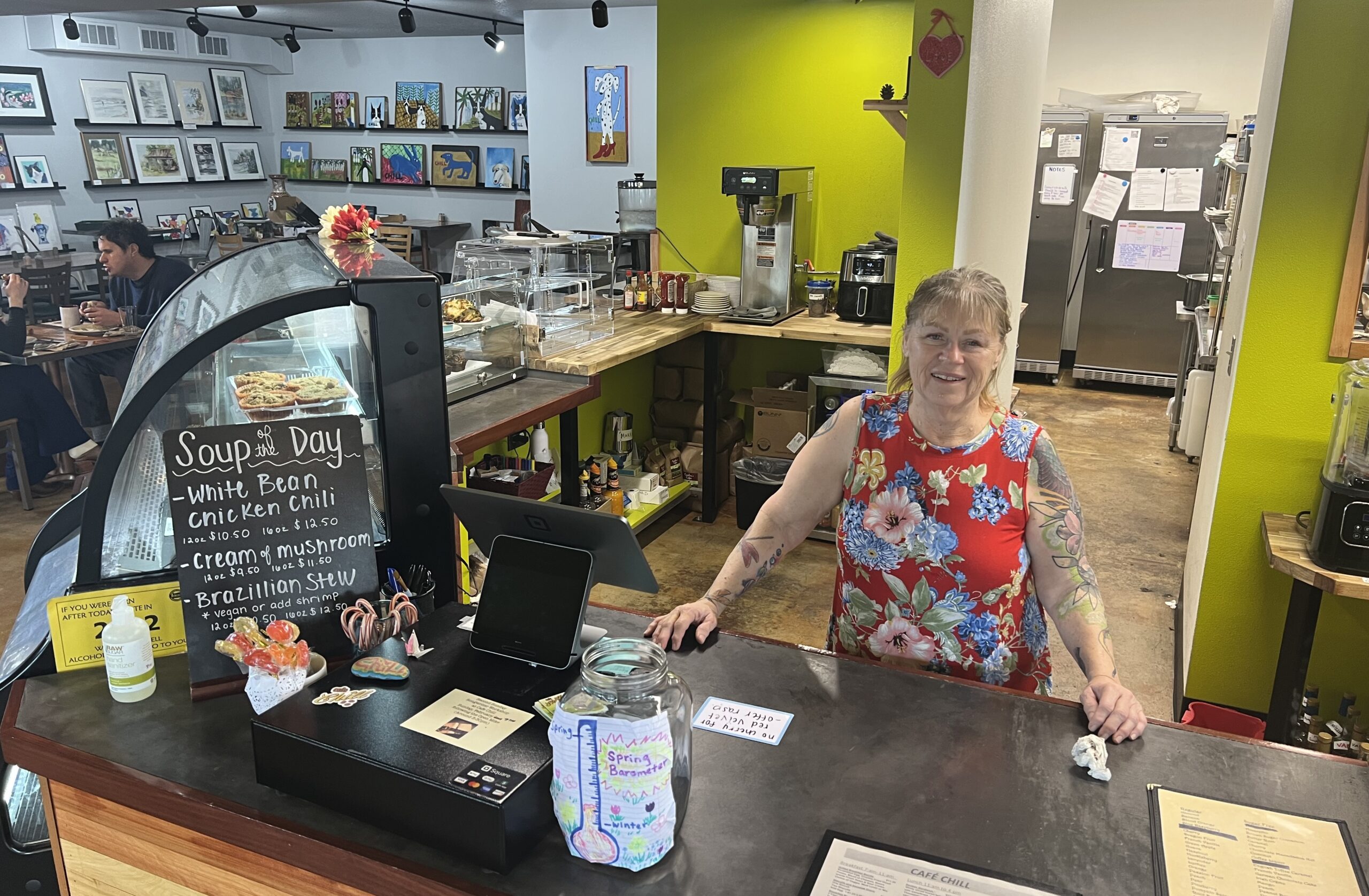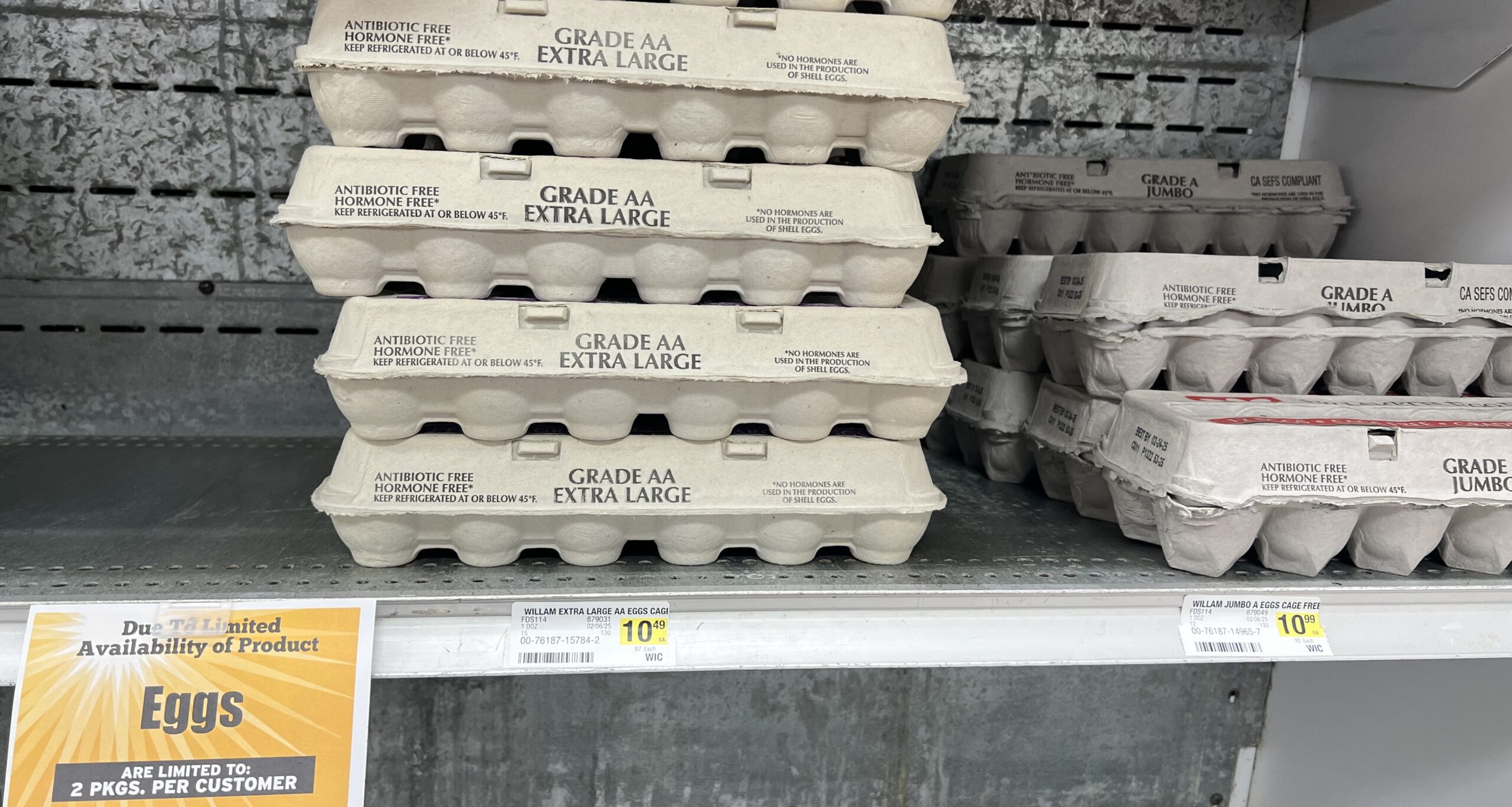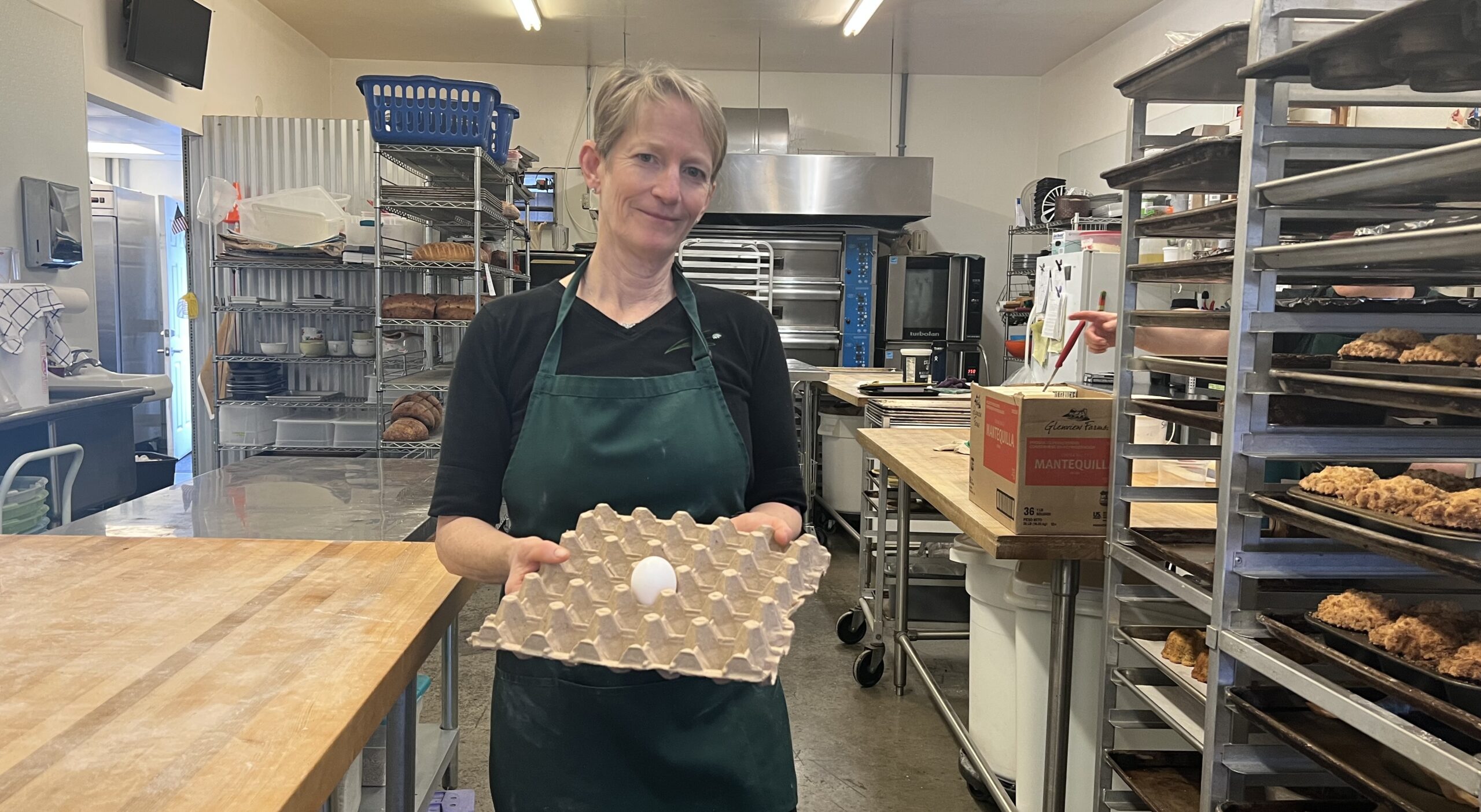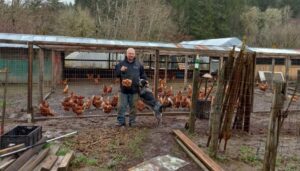
By DANA TIMS/YachatsNews
Ever since Diana Buckley opened Café Chill in 2023, she’s done everything she can to keep the Waldport restaurant every bit as welcoming and laid-back as its name.
In addition to a raft of local customers, Buckley opens her doors to groups of writers and poets. Local art is a staple of the Café Chill’s interior design and musicians are always welcome.
In recent months, however, the operation has been shaken by the same unlikely foment that’s roiling stores, restaurants and consumers nationwide — the search for enough eggs to satisfy demand.
“Customers are still ordering their eggs here,” Buckley told YachatsNews. “But they are bemoaning the fact that when they go shopping, the prices they are paying for eggs is just going through the roof.”
Until recently, Buckley could count on a regional food distributor to supply her with enough eggs — Café Chill goes through anywhere from 15 to 25 dozen large eggs weekly — to stock her business.
But rising prices, driven by an outbreak of bird flu at farms and ranches across the country, has forced her to start driving to Newport and surrounding communities in search of better deals. If a friend happens to be heading into Corvallis or Salem, Buckley will prevail upon them to do a quick price check in those areas, as well.
“I initially thought this would be fairly short-lived, and that we could all just sort of ride it out,” she said. “But based on what I’m seeing now, I don’t think that’s true anymore, and it doesn’t look like there’s any end in sight.”

A widespread concern
Buckley has considerable company when it comes to figuring out what to do about the price and supply of eggs. Everyone from major national grocery chains to local, backyard egg producers are weighing options that aim to keep eggs available, if increasingly expensive.
At Trader Joe’s, for instance, customers can now buy only one or two dozen a day. Industry giant Kroger has not yet implemented any limits nationally, but indicates that some of its divisions have.
Erick Winchell is vice president of non-perishable marketing for Medford-based C&K Markets, which operates a large number of stores including Ray’s Food Place in Waldport and C&K Market in Yachats. In his more than three decades with the company, he hasn’t seen a gloomier situation when it comes to eggs.
“It’s terrible,” he said. “A dozen white eggs is costing me almost $10. Check in with almost any store and you’ll find it’s everywhere.”
Ray’s in Waldport has signs up asking customers to limit their purchases to two dozen eggs per day. And while no one is going to step in and stop anyone from grabbing that third dozen, Winchell said, the hope is that even the suggestion of a limit will help stanch any large-scale outbreak of panic buying.
“We have spent a ton of time working on securing egg supplies for our stores, and we’re doing all we can to keep pricing where it needs to be for our customers,” Winchell said. “But across the board, this is a problem that just seems to be getting worse.”

Avian flu outbreak
The cause of the tumult is the avian flu that exploded at various poultry locations across the country last year. The disease is so fast-moving that entire flocks of commercially raised chickens may be dead almost as soon as the pathogen is detected, according to the Centers for Disease Control.
Efforts to stop the spread led to the culling of tens of millions of chickens last year. The result, while providing a fire break of sorts to the disease’s spread, has resulted in an egg shortage that consumers and almost everyone else is still grappling with, Winchell and others said.
At Pacific Sourdough bakery in Waldport, for instance, co-owner Katie McNeil is making menu adjustments to ease the shortage. She is going to stop making her popular, egg-reliant French cheese puffs called gougere, and will replace them with an egg-free parmesan and prosciutto alternative.
“That’s just one example of what we can do to provide items that our customers love, while trying to cut back a little on our egg usage,” McNeil said.
With an attitude that’s all sunny-side-up, she added, “This is also an opportunity to try to be creative and try new things. And beyond that, what can you do but laugh?”
The owner of Grocery Outlet in Newport reported far fewer problems.
“Our prices haven’t gone up from a month ago and we don’t have any shortages,” said Donna McCrea, owner of Grocery Outlet in Newport. “And, at this point, we aren’t seeing any need for restrictions on sales.”
Grower supply challenges

When it comes to the state of play for local backyard egg producers, however, the pressure remains on, said Pamela Turpen, who, with her husband, Robert, owns Turpen Family Farms near Alsea.
Rising feed and carton costs, she said, forced her last week to boost the price of the farm’s large eggs by 50 cents to $5.50 a dozen. But that increase pales, she said, compared to the $1,000 a week she is paying for feed and the additional $500 she pays every three weeks for cartons.
In terms of avian inventory, Turpen said she currently has 800 chickens, which are spread among 11 different chicken houses. On one recent day, those birds produced a total of 537 eggs, which Turpen then had to hand wash, candle (to look for bacteria-causing cracks) and carefully place into cartons, which had to be labeled.
“People say producers are getting rich,” Turpen said, “but I just don’t know where they are getting that. “Between feed and the cost of cartons, I’m not making any money.”
State and federal authorities are quick to note that commercially produced poultry and eggs, when properly prepared and cooked, are safe to eat. But the rapid onset of bird flu has also shined a bright light on the lengths egg and poultry producers go to in ensuring that safety.
Jenks Hatchery in the Willamette Valley town of Tangent, for instance, undertakes what it calls the “biosecurity” procedures that ward off disease.
“In order for us to enter the hatchery, we have to shower, go through multiple foot baths, change into sanitized scrubs, clean boots and sanitize our cellphones and keys with UV lights,” said general manager Aaron Jenks, who counts Turpen Family Farms among his customers. “So even with increased cases of avian influenza, our hatchery remains safe.”
For consumers worried about continued high egg costs, he had more assuring news.
Typically, bird flu cases tend to drop in March as migratory waterfowl leave the area, Jenks said. As those cases decline, new flocks start producing, with most high-production breeds then starting to lay in 18 to 20 weeks.
The take-away? “Then egg prices should start to decrease,” Jenks said.
The rest of the world, of course, will be watching and waiting.
- Dana Tims is an Oregon freelance writer who contributes regularly to YachatsNews and can be reached at DanaTims24@gmail.com


